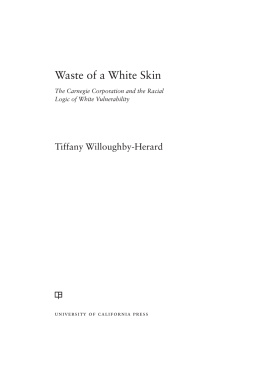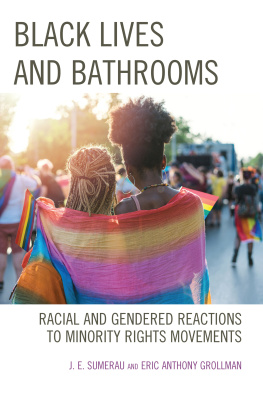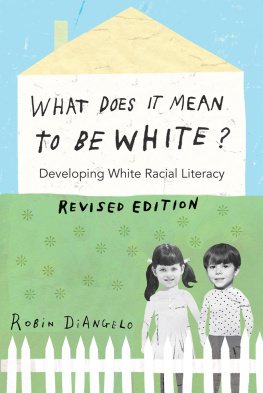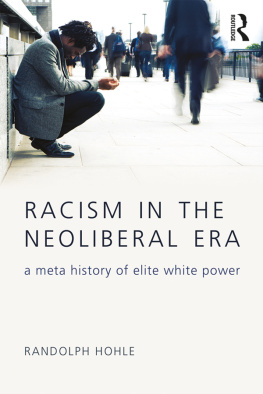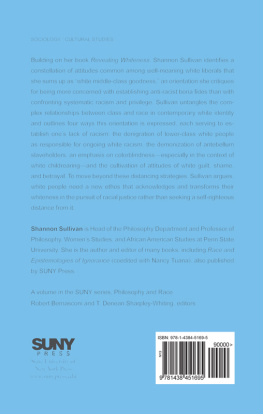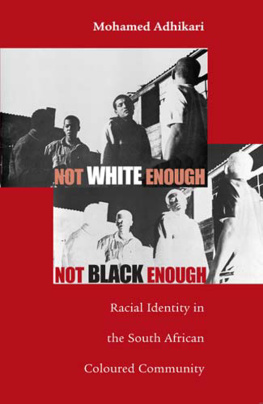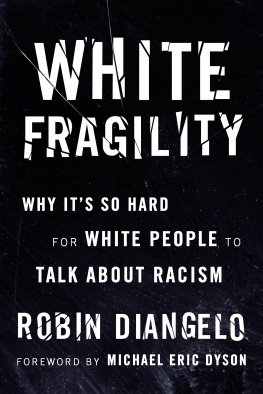The George Gund Foundation has endowed this imprint to advance understanding of the history, culture, and current issues of African Americans.
The publisher gratefully acknowledges the generous support of the African American Studies Endowment Fund of the University of California Press Foundation, which was established by a major gift from the George Gund Foundation.
Waste of a White Skin
The Carnegie Corporation and the Racial Logic of White Vulnerability
Tiffany Willoughby-Herard

UNIVERSITY OF CALIFORNIA PRESS
University of California Press, one of the most distinguished university presses in the United States, enriches lives around the world by advancing scholarship in the humanities, social sciences, and natural sciences. Its activities are supported by the UC Press Foundation and by philanthropic contributions from individuals and institutions. For more information, visit www.ucpress.edu.
University of California Press
Oakland, California
2015 by The Regents of the University of California
An earlier version of chapter 7 was published as Ill give you something to cry about: The Intra-Racial Violence of Uplift Feminism in the Carnegie Poor White Study Volume, The Mother and Daughter of the Poor Family, South African Review of Sociology 41, no. 1 (2010): 78103.
An earlier version of chapter 3 was published as South Africas Poor Whites and Whiteness Studies: Afrikaner Ethnicity, Scientific Racism, and White Misery, New Political Science: A Journal of Politics and Culture 29, no. 3 (2007): 479500.
Library of Congress Cataloging-in-Publication Data
Willoughby-Herard, Tiffany, 1973- author.
Waste of a white skin : the Carnegie Corporation and the racial logic of white vulnerability / Tiffany Willoughby-Herard.
pages cm
Includes bibliographical references and index.
ISBN 978-0-520-28086-1 (cloth : alk. paper)
ISBN 0-520-28086-5 (cloth : alk. paper)
ISBN 978-0-520-28087-8 (pbk. : alk. paper)
ISBN 0-520-28087-3 (pbk. : alk. paper)
ISBN 978-0-520-95997-2 (ebook)
ISBN 0-520-95997-3 (ebook)
1. Carnegie Corporation of New YorkInfluence. 2. ApartheidSouth AfricaHistory20th century. 3. White nationalismSouth AfricaHistory20th century. 4. PovertyPolitical aspectsSouth Africa. 5. South AfricaRace relationsHistory20th century. 6. United StatesForeign relationsSouth Africa. 7. South AfricaForeign relationsUnited States. I. Title.
DT 756. W 55 2015
305.80906809041--dc232014017945
Manufactured in the United States of America
24 23 22 21 20 19 18 17 16 15
10 9 8 7 6 5 4 3 2 1
In keeping with a commitment to support environmentally responsible and sustainable printing practices, UC Press has printed this book on Natures Natural, a fiber that contains 30% post-consumer waste and meets the minimum requirements of ANSI/NISO Z 39.481992 ( R 1997) ( Permanence of Paper ).
This book is dedicated to Naimah, Yani, Nadirah, Nirandah, Nazarah, Michael, Corey, Damion, Diamond, Dominique, Desiree, Nashon, Diana, Jaylen, Ty-Ree, Brittany, Imani, Sadiya, Thandiwe, Elijah, Mariah, Xavier, Xariya, Kaylei, Megan, Caleb, Crystal, Charles, Shawn Jr., Racine, Tyler, Taylum, Santiago, Sierra, Dakota, Jahmosi, Samyia, Sona, Sweden, Sibulele, Oscar, Tawanda, Amara, Azaan, Salvador, Jacob, Dito, Salim, Solomon, Henry, Sammy, Cyrus, Victor, Ruby Ella, Amara, Tyler, Naveen, Jordan, Marlicia, Jordan H., Hind, Omar, Hady, Atisa, Landon, Riann, Rina, Kirsten, Adalee, Sophia, Arianne, Kavya Anasuya Vihaan, Oscar, Ahvianna, Ariella Zenobia, Bona, Derrick Deon, Dylan, Nevaeh, Darren, Amen, Jihae, Aaron, Anthony, Asana Jr., JaKaden, Heriresh, Demi, and Anaya and to the worlds that you will surely create.
All over, weve seen intense oppression. Im from Detroit, initially, and weve seen a lot of oppression there, historically as well as currently. New York has certainly seen its share. Washington, D.C., has seen its share. So, we dont want to be like people on different plantations arguing about which plantation is worse. What we have to do is to correct the whole problem, and were about correcting the problem here in Jackson.
Chokwe Lumumba (19472013)
June 6, 2013
A vote for a Democrat is nothing but a vote for a Dixiecrat.... Up here in the North youve got the same thing the Democratic party, they dont do it that way, they got a thing that they call gerrymandering. They maneuver you out of power. Even though you can vote, they fix it so youre voting for nobody. They got you going and coming. In the South theyre political wolves, in the North theyre political foxes. A fox and a wolf are both canine, both belong to the dog family. Now, you take your choice. You gonna choose a Northern dog or a Southern dog. Because either dog you choose, I guarantee you, youll still be in the dog house.... And I hope that when I come back, Ill be able to come back and let you know how our African brothers and sisters feel toward us. And I know before I go there that they love us. Were one; were the same; the same man who has colonized them all these years, colonized you and me too all these years.
Malcolm X (19251965)
The Ballot or Bullet, April 12, 1964
King Solomon Baptist Church, Detroit, Michigan
Contents
List of Illustrations
Preface
POSSESSIONS, BELONGING, COMPANIONSHIP, OR DONT MIND THE GAP
Dean Huttons image, The Poverty of Being Unwanted: Danville, draws attention to the political uses of white identity and the possessions and kinds of spaces that typically signal white privilege. Yet the title and the caption refer meaningfully to Mother Teresa and the gap (typically colored white) between privilege and misery.
In a different vein, I retrieve the history of white nationalism, segregationist philanthropy, and global racial politics that repeatedly rediscovers the white poor to suture over racial regimes. My work is concerned with the racial logics associated with rediscovering this community to shore up white nationalisms. Where Huttons goal is to debunk the explicit snarl in the epithet, waste of a white skin, my goal is to understand how it functions to prop up antiblack governance and sociality. To do this, I use methods and theories appropriate to race and ethnic politics and political theory, especially critical black political thought, black feminist theories, and black internationalism.
While conducting research in South Africa, archivists queried me, an African American woman, about the origin of my interest in poor whites. They hinted that as an American I would write a book that othered South African race relations. Since we had our own experience of segregation, they explained, we should not represent apartheid as exceptional.
Should I prove to be a credit to my race As Barbara Christian explains:
People of color have always theorized.... [O]ur theorizing is often in narrative forms, in the stories we create, in the riddles and proverbs, in the play with language, because dynamic rather than fixed ideas seemed more to our liking. How else have we managed to survive with such spiritedness the assault on our bodies, social institutions, countries, our very humanity? And women, at least the women I grew up around continuously speculated about the nature of life through pithy language that unmasked the power relations of their world[,]... though more in the form of the hieroglyph, a written figure that is both sensual and abstract.

